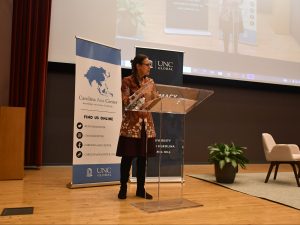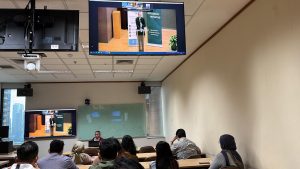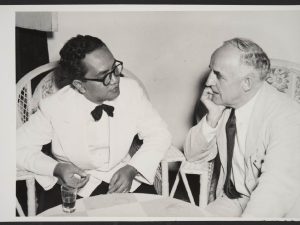Indonesia in International Relations Conference Features Former US Ambassador Piper Campbell
February 16, 2023
UNC Global Affairs

Ambassador Piper Campbell speaks to attendees in Chapel Hill, Jakarta and Zoom.
Piper Campbell, former U.S. ambassador to Mongolia and chargé d’affaires to the Association of Southeast Asian Nations (ASEAN), discussed the evolution of Indonesia’s position in international relations during UNC-Chapel Hill’s “Indonesia in International Relations” conference, January 26-27. Campbell’s talk was part of the Diplomacy Initiative’s Diplomatic Discussions, a series of expert talks and panels that provide Carolina students with inside perspectives on the world of foreign policy and diplomacy. During her 30-year career in the U.S. Foreign Service, Campbell acquired wide-ranging expertise on Southeast Asia.
The Carolina Asia Center (CAC) co-convened the conference virtually with Universitas Pelita Harapan (UPH). During a hybrid session, Campbell engaged in a live dialogue over Zoom with Aleksius Jemadu, a lecturer at UPH.

Campbell offered multiple “lenses” to frame Indonesia’s place in regional and international relations and shared her thoughts on the country’s gains towards leadership in Southeast Asia.
“We need to consider Indonesia as a large and significant country in its own right,” said Campbell. “Indonesians want their leaders to pursue an independent path as befits a country of Indonesia’s size and capabilities. They don’t want to be second to anyone – not the U.S., not China. Expectations are high regionally and globally, as well as internally. This isn’t an easy path to forge.”
Campbell outlined several barriers she observed that could prevent Indonesia from becoming a leader in the region. Jemadu prepared a response in return, and the two engaged in a spirited debate. They ended the discussion with questions from the audience.
Nearly 200 students, faculty and staff joined the conference in-person or virtually in both Chapel Hill and Jakarta. According to Kevin Fogg, associate director of CAC and conference organizer, the collaborative approach to the conference format reflects Carolina’s overall approach to global partnership.
“Carolina is global both in the way that we partner with other institutions and scholars around the world in the pursuit of global solutions and in how we bring the world to North Carolina,” said Fogg in his opening remarks.
During Campbell’s visit to UNC-Chapel Hill, the former ambassador spoke with students in HIST 132: Modern Southeast Asia about the region’s geostrategic position, and she met with graduate students to explore the state of Southeast Asian Studies in the United States.
“By interacting with experienced diplomats like Amb. Campbell, Carolina students are learning what it takes to solve global challenges,” said Barbara Stephenson, vice provost for global affairs and former U.S. ambassador. “The Diplomacy Initiative is preparing Tar Heels to become tomorrow’s global leaders.”
Carolina and Indonesia’s Throughline
The conference was held nearly 75 years after Indonesia gained independence. Today, Indonesia is the world’s fourth most populous country and largest Muslim-majority country, and Southeast Asia’s largest economy. In November 2022, the country presided over the G20 Summit, the premiere forum for the world’s leading economies.

UNC-Chapel Hill has a historical connection to Indonesia’s independence. Frank Porter Graham, UNC-Chapel Hill president from 1930-49, played an important role in negotiations for the recognition of Indonesia’s independence in 1947-48.
The Truman administration appointed Graham to serve on the United Nations Committee of Good Offices. In this role, he facilitated negotiations with Indonesian representatives and oversaw the signing of the Renville Agreements, the first multi-lateral treaty signed by the Republic of Indonesia.
“Frank Porter Graham’s work in Indonesia is a testament to Carolina’s history of global engagement,” said Stephenson.
“Indonesia in International Relations” highlights UNC-Chapel Hill’s strengthened commitment to teach, understand and promote diplomacy in Southeast Asia, said Fogg. In summer 2022, the University secured a $900,000 grant from the Henry Luce Foundation to advance the study of Southeast Asia, positioning the University as the hub for pan-Asian studies in the southeastern U.S.
“I am proud that Carolina has this particular historical connection with the independence of Indonesia, and I hope that we can continue to forge great relationships for decades to come,” said Fogg.
